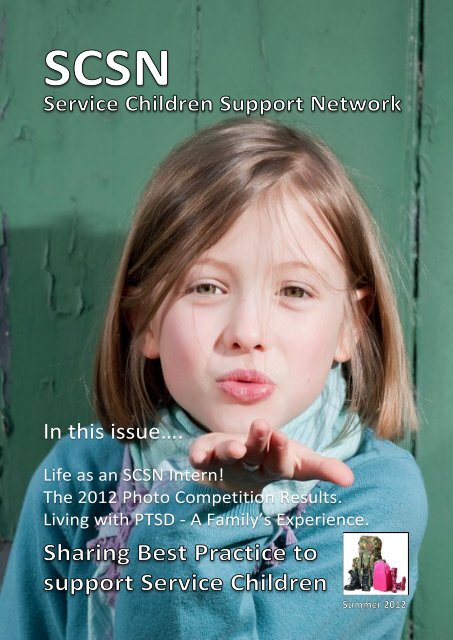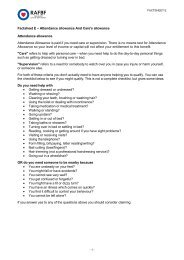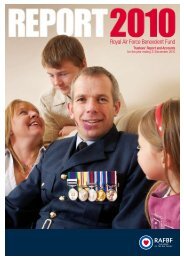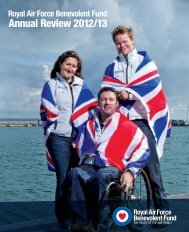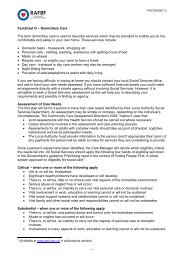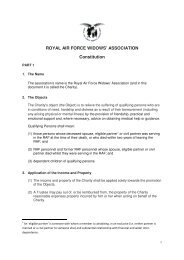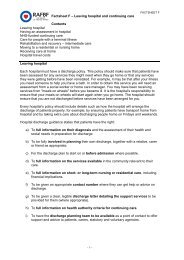Service Children Support Network - RAF Benevolent Fund
Service Children Support Network - RAF Benevolent Fund
Service Children Support Network - RAF Benevolent Fund
You also want an ePaper? Increase the reach of your titles
YUMPU automatically turns print PDFs into web optimized ePapers that Google loves.
SCSN<br />
<strong>Service</strong> <strong>Children</strong> <strong>Support</strong> <strong>Network</strong><br />
In this issue….<br />
Life as an SCSN Intern!<br />
The 2012 Photo Competition Results.<br />
Living with PTSD - A Family’s Experience.<br />
Sharing Best Practice to<br />
support <strong>Service</strong> <strong>Children</strong><br />
Summer 2012
SCSN<br />
I can hardly believe that it’s been 3 months<br />
since I last wrote for our SCSN newsletter, time<br />
seems to fly by so quickly! So on with the<br />
news… We recently extended a warm welcome<br />
to our first SCSN Intern, Katherine Grove. She<br />
threw herself into all aspects of our work and<br />
has even written a number of articles for this<br />
edition of the newsletter. She has just<br />
graduated from her secondary PGCE course and<br />
will leave us at the end of June to take up her<br />
first teaching role. We wish her every success in<br />
the future, it has been a delight to have her<br />
with us.<br />
Our spring seminars and training events went<br />
very well and it was great to meet so many of<br />
you at the Universities of Oxford, Warwick, and<br />
Reading and at the Vulnerable <strong>Children</strong><br />
Conference in Buckinghamshire. We will host a<br />
number of other events this summer and<br />
autumn and I look forward to meeting many<br />
more of you then. I have also attended 2<br />
National Conferences over the past few weeks<br />
and both provided much food for thought. The<br />
Royal British Legion Stakeholders’ Conference<br />
at the start of May encouraged us to reflect on<br />
our current challenges and constraints and to<br />
look to the future and continue to work in<br />
partnership with each other.<br />
The SSAFA Additional Needs and Disabilities<br />
Conference focused on <strong>Service</strong> families who<br />
have children with additional needs. Hearing<br />
families speak about their experiences was both<br />
eye-opening and inspirational and while<br />
chatting to Mums and Dads over coffee, it was<br />
obvious that many families feel that<br />
professionals are failing their children. I want to<br />
follow up on this and I would really like to hear<br />
more from parents and professionals alike.<br />
Thank you to all the children who entered our<br />
‘Through the Eyes of a <strong>Service</strong> Child’ 2012<br />
Photographic Competition. There were so many<br />
wonderful entries that it was very tough job for<br />
our judges! I hope you enjoy looking at the<br />
winning entries later in this edition.<br />
Congratulations all 12 winners and I look<br />
forward to meeting them at the official<br />
presentation in August at the <strong>RAF</strong> Museum<br />
London. Of course I must thank our three<br />
judges Jenny Green OBE, Christine Druce and<br />
Iain Duncan for giving up their time.<br />
On the research front, Dr Grace Clifton, the<br />
SCSN Academic & Research Advisor, is working<br />
hard on our first SCSN Research Conference<br />
which will take place on 10 September at the<br />
University of Oxford. Places are filling up<br />
quickly so I urge you to book soon as we only<br />
have a few places left.<br />
We are delighted to announce that the<br />
SCSN/Buckinghamshire County Council/Halton<br />
School Project has again won funding from the<br />
MOD £3M <strong>Service</strong> <strong>Children</strong> <strong>Fund</strong>. This will<br />
enable us to extend our <strong>Service</strong> <strong>Children</strong><br />
<strong>Support</strong> Project in Buckinghamshire still further.<br />
Our two new ‘<strong>Service</strong> <strong>Children</strong> <strong>Support</strong><br />
Coordinators’ are now fully trained and very<br />
busy with their new roles in schools and you<br />
can hear directly from them in this issue.<br />
I would like to thank the Independent on<br />
Sunday for including me in this year’s Happy<br />
100 list and for giving me the chance to further<br />
promote the work of SCSN. I would also like to<br />
thank the University of Oxford for recognising<br />
the contribution of SCSN and the importance of<br />
<strong>Service</strong> <strong>Children</strong>’s life experiences. It was an<br />
enormous privilege to receive a Vice<br />
Chancellor’s Civic Award at this year’s<br />
‘Encaenia’ Ceremony and to be honoured<br />
alongside some truly inspiring guests including<br />
Nobel Prize winner, Aung San Suu Kyi.<br />
Finally we would love to hear how your <strong>Service</strong><br />
<strong>Children</strong> £3M projects are progressing as well<br />
as catching up with what’s going on in your<br />
area. Please send any newsletter articles and<br />
photographs to us using the usual address:<br />
contact@servicechildrensupportnetwork.com<br />
The closing date for receipt is 20 August 2012.
“Everything will be OK”<br />
- One family’s struggle with PTSD.<br />
Deborah Harrison, Professor of Sociology at the<br />
University of New Brunswick, Canada, who has<br />
been researching Canadian military families<br />
since 1990, sent us this article by Isabel Angell,<br />
NPR News, Washington DC . Deborah says “The<br />
article is about William and his family and their<br />
struggle with his PTSD. Although William is a<br />
Police Officer I think his story has real relevance<br />
to <strong>Service</strong> families living with a loved one with<br />
PTSD”.<br />
SCSN would like to thank Isabel Angell for<br />
allowing us to reprint her article and remind<br />
readers that Deborah will be one of the guest<br />
speakers at the SCSN Academic Conference that<br />
is taking place at Oxford University in<br />
September.<br />
“Everything Will Be Okay”: One Family’s<br />
Struggle With PTSD (post-traumatic stress<br />
disorder) has been getting a lot of attention<br />
recently as soldiers return from the wars in<br />
Afghanistan and Iraq. But PTSD can also affect<br />
civilians. William Edwards developed PTSD after<br />
witnessing a fatal shooting while on duty as a<br />
police officer in Camarillo, California. His life –<br />
and the lives of his family members – has never<br />
been the same since.<br />
Williams Edwards joined the Camarillo Police<br />
Department when he was just 21. He needed a<br />
way to support his wife and baby daughter,<br />
Dori. He was a good cop, but looking back, he<br />
says he doesn’t think he was suited for the<br />
profession – perhaps he was too sensitive.<br />
The daily hardships of the job had already been<br />
catching up with William when he was involved<br />
in a shooting while on duty six years ago. That<br />
night, a young gang member tried to run<br />
William over with his car. Dori remembers that<br />
as the night everything changed.<br />
William would display extreme mood swings,<br />
from being almost catatonic and sitting on the<br />
couch unresponsive, to completely disappearing<br />
from the house. Dori remembers sometimes<br />
she wouldn’t see him for days at a time; she<br />
didn’t even know where he was.<br />
William says sometimes he lived out of his car<br />
and slept in the station parking lot. Today, it<br />
bothers him that his fellow officers knew this<br />
and didn’t do anything. Even when he tried to<br />
seek help at his station, he was denied.<br />
“There were several instances where I tried to<br />
turn in my badge and my gun and express to my<br />
department that I was incapable of returning to<br />
work,” he says. “You know, it’s that macho<br />
profession and you just put your boots back on<br />
and go to work.”<br />
Dori says her mother would call the station over<br />
and over, even reading them the symptoms for<br />
PTSD over the phone from the Diagnostic and<br />
Statistical Manual, the professional guide to<br />
mental disorders. But nothing happened.<br />
“No one would help because they didn’t want<br />
that bad rep on their station,” she says.<br />
Meanwhile, things kept getting worse for<br />
William.<br />
“There was no light at the end of the tunnel,<br />
there was nothing, it was just darkness,”<br />
William says. “And I didn’t see any way out. And<br />
that’s when I started to feel like I was absolutely<br />
useless to my daughter, to my wife, and I just<br />
wanted to release them of that burden.”<br />
One time, Dori remembers finding her father in<br />
a closet with a gun to his head. She also recalls<br />
another time when she and her mother found<br />
him about to hang himself in their garage.<br />
“That was always one of my biggest fears, that<br />
one day I would get the call or I would wake up<br />
and he would be gone forever… not just 50<br />
miles away doing who knows what, but that he<br />
would just never come back,” Dori says.
But Dori never gave up on her father. She<br />
remembered when she was little and afraid to<br />
go to sleep, her dad would tell her that<br />
everything would be okay. She never forgot<br />
how comforting that was to her. Even when he<br />
would lay on the bed, unable to move, she<br />
would tell him that everything would be okay.<br />
William remembers this part, and says that<br />
knowing his daughter still loved him helped him<br />
hold on and survive the tough times.<br />
Our Cover Girl!<br />
- the story behind that kiss…<br />
‘Blowing a Kiss’<br />
by Connie Hickman-Tinnieswood.<br />
Dori and her father William.<br />
Today, William is doing much better. He retired<br />
from the force three years ago and now owns<br />
two businesses: a property inspection firm and<br />
a photography studio. He and Dori’s mother<br />
have since separated, but the family remains<br />
close to this day. Dori is a freshman at UCLA.<br />
Forthcoming Events<br />
16th July 2012 ‘Building Resilience in <strong>Service</strong><br />
<strong>Children</strong>’ Speakers - Ros Hearne, Educational<br />
Psychologist, Warwickshire, and Katie Alvey,<br />
Educational Psychologist Oxfordshire. This is a free<br />
event but please reserve a place by email to:<br />
contact@servicechildrensupportnetwork.com<br />
September 2012 ‘Introductory Training Day’ Suffolk<br />
– more details to follow soon.<br />
September 2012 ‘<strong>Service</strong> <strong>Children</strong>: Implications and<br />
Mitigations’ Cornwall – more details to follow soon.<br />
Remember that SCSN offer bespoke training days to<br />
meet the needs of LA staff, schools, governors and<br />
other health and welfare professionals as required.<br />
For more details please email:<br />
contact@servicechildrensupportnetwork.com<br />
This issue of the SCSN Newsletter is graced by<br />
our very own Cover Girl! As you will see later,<br />
Connie won first prize in the age 6-9 category in<br />
the SCSN Photographic Competition with her<br />
photo entitled ‘Blowing a Kiss’.<br />
The story behind Connie’s photograph was<br />
particularly moving. Her Mum, Natalie Hickman<br />
wrote: When Connie was two years old her<br />
brave Royal Marine daddy died of a brain<br />
tumour, which was a horrendous time for me<br />
and Connie. We re-located back to Plymouth<br />
the following summer so we could be closer to<br />
family and friends. Soon, we began to re-build<br />
our lives, remembering and missing Simon<br />
(Connie's daddy, my husband) every day. Two<br />
years later I met someone (Alex) who would<br />
you believe it was in the army! The friendship<br />
developed into a fantastic relationship; Alex is<br />
now a wonderful father to Connie and nearly six<br />
years on, they are joined at the hip! Last year<br />
Alex was in Afghanistan for seven months and<br />
Connie and I missed him very much. Connie<br />
would keep an eye on the news and be very<br />
fraught at any fatalities or casualties fearing<br />
that the worse would happen again. I'm glad to<br />
report Alex returned to us safe and sound.
Schools - <strong>Support</strong> our Forces<br />
on Friday 12th October<br />
RWB Day is a chance for your school to show support for families<br />
of our Armed Forces. By taking part you can raise money to<br />
suppor t children who have mums or dads serving in the Army,<br />
Royal Navy & Royal Marines or Royal Air Force.<br />
To get involved you just need to have fun with a red, white and<br />
blue theme - you can dress up in red, white and blue, run a themed<br />
event, do a sponsored activity or enter our poetry competition.<br />
We suggest that anyone taking part should at least donate a<br />
pound and dress up in one or all of the colours. It’s that simple!<br />
All the money<br />
raised will be<br />
used to support<br />
the work of:<br />
www.redwhiteblueday.co.uk
SCSN Profile<br />
Name:<br />
Emma Cheedy - <strong>Service</strong> <strong>Children</strong><br />
<strong>Support</strong> Coordinator<br />
So what’s your background<br />
I have been married for almost 13 years to Paul, who is serving in the <strong>RAF</strong>, and we have<br />
two children. Before getting married, I was a Civil Servant working with the <strong>RAF</strong> Police and<br />
Security Flight at <strong>RAF</strong> Akrotiri in Cyprus. Since having the boys, I have spent most of my<br />
time volunteering with various <strong>Service</strong> charities and organisations, and gained<br />
a Diploma in Child Day Care. Once the boys were both in school, I started working in the<br />
Foundation class of a school with a high percentage of <strong>Service</strong> children.<br />
What does your role entail<br />
I support five schools in the <strong>RAF</strong> High Wycombe area that have <strong>Service</strong> children. My day is<br />
spent visiting one, maybe two, of the schools and the children with whom I am working,<br />
planning the activities I will be doing with each child or group on our next meeting,<br />
keeping my records and notes up-to-date, updating head teachers, contacting outside<br />
agencies or new schools any of the children may be moving to which could be anywhere in<br />
the world.<br />
What has been your experience so far<br />
Some parts have been challenging! Some schools feel that parents won't like the <strong>Service</strong><br />
children being singled out or parents think, 'What does she know about how we live' But,<br />
once the parents realise that I am 'one of them' everything seems to fit into place! Parents<br />
are very pleased that the schools have this opportunity and all feel it will be of benefit not<br />
just to the children but the <strong>Service</strong> family as a whole. I am really enjoying the work and<br />
find it very rewarding.<br />
What are the key issues that you have encountered<br />
I have been doing lots of work on Transitions where children have been<br />
moving to new schools . Lots of the children I have been working with<br />
seem to be moving overseas at the moment which presents<br />
additional challenges! I have also been supporting children who<br />
have a parent deployed overseas and helping them to cope with<br />
the effects on the family as a whole. I have also found that a<br />
number of parents have been having problems when applying for<br />
places in schools for their children when they have been posted to<br />
new areas so I have been helping them to sort things out.
in the <strong>RAF</strong>. “Instead, I am just about to start my<br />
first ‘proper’ job for 10 years, something I didn’t<br />
think I would be able to do being married to the<br />
<strong>RAF</strong>, in the form of my husband Paul, and the<br />
transient lifestyle that comes with his job.”<br />
An <strong>RAF</strong> wife has become one of the first to find<br />
work using an innovative new company set up<br />
to help military spouses. Emma Cheedy started<br />
work in April as a <strong>Service</strong> <strong>Children</strong> <strong>Support</strong><br />
Coordinator for the <strong>Service</strong> <strong>Children</strong> <strong>Support</strong><br />
<strong>Network</strong> after registering with Recruit for<br />
Spouses, a website established by the wife of a<br />
serving Army officer. Heledd Kendrick set up<br />
the company in response to the struggles faced<br />
by many service spouses to find work.<br />
The company, which donates all profits to<br />
service charities, allows forces spouses to<br />
register on its website free of charge.<br />
Employers then pay a small fee to advertise jobs<br />
and access the database of spouses with skills<br />
ranging from shop floor to boardroom level. Its<br />
patron is Lady Jean O’Donoghue, wife of<br />
General Sir Kevin O’Donaghue, who described<br />
Recruit for Spouses as “a great opportunity (for<br />
spouses) to re-enter the workplace and prove<br />
that we really can make a valuable and<br />
worthwhile contribution to employers<br />
countrywide.”<br />
She said: “Recruit for Spouses will give spouses<br />
the confidence to show their real worth.<br />
Spouses have a wide range of skills and talents.<br />
Many are highly qualified but have had to put<br />
their talents on hold, or channel them into<br />
unpaid occupations because of the vagaries of<br />
service life and the raising of a family. Although<br />
the latter affects civilians as well, I think that<br />
there are additional responsibilities attached to<br />
being a spouse of a serviceman or<br />
servicewoman; there will be times when the<br />
spouse is the sole carer; there will be big<br />
upheavals in the children's lives which only the<br />
spouse can deal with because of service<br />
commitments.“<br />
Emma, who has two sons – Dylan, aged 10 and<br />
Rhys, 8, said she thought she faced permanent<br />
unemployment while her husband was serving<br />
Dylan was born in Cyprus, but the family left<br />
when he was eight weeks old, and before his<br />
first birthday had moved from <strong>RAF</strong> Akrotiri to<br />
<strong>RAF</strong> Aldergrove in Northern Ireland to <strong>RAF</strong> Brize<br />
Norton. Rhys was born whilst the family was at<br />
<strong>RAF</strong> Brize Norton and the Cheedys remained<br />
there for more than eight years, before moving<br />
first to <strong>RAF</strong> Daws Hill then, after 15 months, to<br />
<strong>RAF</strong> High Wycombe.<br />
Emma and her family.<br />
Limited to volunteering work or school jobs, like<br />
many military spouses, Emma became an active<br />
member of The Royal British Legion Branch in<br />
Carterton, helping with fundraising for the<br />
Poppy Appeal. She was also a SSAFA Forces<br />
Help In-<strong>Service</strong> Volunteer and was the<br />
Community Volunteer Coordinator at <strong>RAF</strong> Brize<br />
Norton, Beaver Scout Leader for the 2nd Brize<br />
Norton Air Scout Group and was offered,<br />
through volunteering in school, a job as a<br />
lunchtime supervisor.<br />
She said: “I had come to realise that if I wanted<br />
to work it needed to be in a school environment<br />
or from home.
I needed to be around for the boys and this<br />
became all too obvious when Paul was deployed<br />
to Afghanistan for six months in 2009. Without<br />
family close by and the school holidays to deal<br />
with it would have been impossible for me to<br />
have worked when daddy being away became<br />
too much for Dylan to cope with.<br />
“As most military wives will say ‘we just get on<br />
with it’; we give up our own career paths to<br />
raise our families and follow our husband’s<br />
careers. It can be very lonely and disheartening<br />
sometimes, especially when job hunting is<br />
limited as you don’t know how long you will be<br />
in one place.<br />
“Recruit for Spouses is a fantastic concept.<br />
Military spouses can look at the jobs advertised<br />
by employers who understand that it is in some<br />
cases only short term work and it is work that is<br />
‘local’ to where people are based or from<br />
home. The employers will be giving so much<br />
more than just a job and in return there is a<br />
pool of work skills, qualifications and experience<br />
in the form of military spouses looking for work.<br />
“So I’ve started my new job. I am nervous and<br />
excited; Paul’s work is disappointed as I will no<br />
longer spend all my time baking. As to what I<br />
am going to spend my first pay packet on I’ve<br />
seen a lovely pair of pink shoes…”<br />
Joy O’Neill, founder and chair of the <strong>Service</strong><br />
<strong>Children</strong> <strong>Support</strong> <strong>Network</strong>, said she knew how<br />
forces spouses could struggle to find work. “As<br />
a service wife I know how difficult it can be to<br />
find meaningful work in a new area and as an<br />
employer I know how important it is to recruit<br />
the right person. Using Recruit for Spouses has<br />
been a positive and professional experience.<br />
Within a month I’d been able to appoint Emma,<br />
a high calibre candidate for an important new<br />
role. I will definitely use Recruit for Spouses<br />
again to advertise future vacancies,” said Mrs<br />
O’Neill.<br />
*To register with Recruit for Spouses or find out<br />
how to advertise jobs on the site,<br />
visit www.recruitforspouses.co.uk or email<br />
info@recruitforspouses.co.uk.<br />
Marking the Jubilee!<br />
in Buckinghamshire.<br />
On Sunday, 27 th May 2012, the County of<br />
Buckinghamshire celebrated The Diamond<br />
Jubilee of Her Majesty The Queen in a <strong>Service</strong> of<br />
Thanksgiving. The service, held at the Parish<br />
Church of St Mary The Virgin, Aylesbury, was<br />
arranged by the Chairman of Buckinghamshire<br />
County Council, Mrs Marion Clayton.<br />
Alan Wilson, the Bishop of Buckingham<br />
delivered the address, while the High Sheriff of<br />
Buckinghamshire, Mrs Carolyn Cumming and<br />
Her Majesty’s Lord-Lieutenant of<br />
Buckinghamshire, Sir Henry Aubrey-Fletcher,<br />
Bt JP, gave the readings. <strong>Service</strong> Pupils from<br />
Halton School, Alex in Year Six and Evie and<br />
Nicholas both in Year Five also gave readings at<br />
the service. The music was provided by St<br />
Mary’s Choir and the High Wycombe Music<br />
Centre Intermediate Choir. The service was<br />
tremendously uplifting and all of the children,<br />
readers and singers alike, made a splendid<br />
contribution. The service was followed by a<br />
scrumptious afternoon tea in the County<br />
Museum Gardens, enjoyed by all.<br />
We would be delighted to know how you<br />
celebrated Her Majesty the Queen’s Diamond<br />
Jubilee. Please send any photographs and<br />
articles to:<br />
contact@servicechildrensupportnetwork.com<br />
by the end of July.
Army Childhood<br />
by Clare Gibson<br />
Those who work alongside service children and,<br />
of course, their parents and families, are well<br />
aware of the ways in which these youngsters’<br />
lives differ from those of children in civilian<br />
communities, and of the challenges that they<br />
face. Another group of people also has an<br />
innate understanding of today’s service<br />
children: those who were themselves once<br />
army, air-force or navy ‘brats’. And not only do<br />
they have personal experience of how service<br />
life impacts on children, but the benefit of<br />
hindsight also gives them a unique perspective<br />
on the ways in which growing up as a forces’<br />
child can continue to have a profound influence<br />
later in life.<br />
As the daughter, granddaughter and greatgranddaughter<br />
of regular soldiers, I have always<br />
been intrigued by the differences and<br />
similarities in the experiences of army children<br />
across the generations. It is a subject that has<br />
been poorly documented and studied, however,<br />
which is why I set up The Army <strong>Children</strong> Archive<br />
(TACA) website (www.archhistory.co.uk) to<br />
chronicle British army children’s history. As well<br />
as looking back into the past, TACA also has an<br />
eye on the present and future and tries to raise<br />
awareness of the issues affecting today’s service<br />
children, and to help them where it can.<br />
Last year, I was commissioned by Shire Books to<br />
write Army Childhood: British Army <strong>Children</strong>’s<br />
Lives and Times. An illustrated outline of the<br />
‘army-child experience’, Army Childhood<br />
encompasses over three hundred years of army<br />
children’s history, covering such areas as the<br />
army’s changing attitude to its soldiers’ young<br />
dependants; how they have been transported<br />
to postings all over the world; and how and<br />
where they have been housed, educated and<br />
entertained. I hope that readers will find the<br />
book interesting, and that it will provide them<br />
with some informative and illuminating food for<br />
thought.<br />
Clare Gibson<br />
Army Childhood: British Army <strong>Children</strong>’s Lives<br />
and Times, by Clare Gibson, is a 64pp<br />
paperback, published as part of Shire<br />
Publications’ Shire Library series in May 2012.<br />
RRP £6.99.<br />
http://www.shirebooks.co.uk/store/Army-<br />
Childhood_9780747810995<br />
Child Bereavement Charity<br />
Conference<br />
2012<br />
‘Grief and<br />
bereavement in<br />
schools – Let’s talk<br />
about it’<br />
Thursday 20 th September 2012 - University of<br />
Warwick. A unique opportunity to learn directly<br />
from bereaved young people and professionals.<br />
Schools have a vital role to play in the lives of<br />
bereaved children – up to 70% of schools have a<br />
bereaved pupil on their role at any one time.<br />
The programme will include presentations,<br />
discussions and workshops.<br />
If you are interested in finding out more or<br />
booking a place please contact:<br />
conferences@childbereavement.org.uk or<br />
phone 01494 568910 at the Child Bereavement<br />
Charity .
SCSN<br />
<strong>Service</strong> <strong>Children</strong> <strong>Support</strong> <strong>Network</strong><br />
ACADEMIC<br />
CONFERENCE<br />
2012<br />
‘Reflecting on Research and<br />
Practice for the <strong>Children</strong> of<br />
HM Forces Families’
‘Reflecting on Research and<br />
Practice for the <strong>Children</strong> of<br />
HM Forces Families’<br />
Monday 10th September 2012<br />
Dept of Education, University of Oxford, 15 Norham Gardens, Oxford. OX2 6PY<br />
Coffee and Registration from 09.15 Finish 16.30<br />
This one day Academic Conference will shine the spotlight on the research currently being undertaken in<br />
the fields of education, psychology, and health relating to the life experiences of service children and<br />
their families in the UK.<br />
Our presenters will focus on the emerging issues in this under-researched area and consider the<br />
implications for current and future policy development and practice.<br />
Topics<br />
· Families bereaved through military death<br />
· Adolescents living through deployments<br />
· Meeting the needs of military families with young children<br />
· Military families coping with a child with special educational needs/disability<br />
· Impact of having a military father on families.<br />
The event will be of particular interest to:<br />
· Academics working in universities and colleges of further and higher education<br />
· Secondary, Primary and Early Years teachers and practitioners<br />
· Researchers working within the fields of education, psychology, health and social care<br />
· Local Authority Advisers and Consultants<br />
· Professionals from education, psychology, health and social care<br />
· Military Charities and Welfare Organisations<br />
· Anyone dedicated to high-quality provision for <strong>Service</strong> children and families in the UK.<br />
Early Bird Conference Fee: £50 (booked by 15th July 2012)<br />
Conference Fee after 15th July: £65 (book by 31st August 2012)<br />
Fee includes learning materials, refreshments and a light lunch.<br />
To reserve a place please complete the Conference Booking Form and send it to<br />
contact@servicechildrensupportnetwork.com<br />
bookings will be confirmed by email or post.<br />
Terms and Conditions<br />
Payment required with booking - Fees are not refundable.
My Daddy’s<br />
Going Away…<br />
By Lt Col Chris MacGregor KRH<br />
My children are now 8 and 6 years old. They<br />
attend a small comprehensive primary school<br />
near Reading and have just truly settled in.<br />
They are now known by the staff and children<br />
alike and have carved their niches.<br />
At the end of this term, however, they will<br />
move again to another school: the third for Ben<br />
and the second for Ellie (this does not include<br />
the various kindergartens and nurseries they<br />
have been to in Germany and England). They<br />
will have to mourn their lost friends and make<br />
new ones, establish themselves once more in<br />
the hierarchy of class politics, settle into new<br />
teaching styles and environments and<br />
demonstrate their talents and admit their<br />
weaknesses once more.<br />
The teachers will try hard to understand their<br />
backgrounds and their previous reports, but<br />
they will, inevitably, want to make their own<br />
assessments of the children. In some regards,<br />
this movement is a good thing. Military<br />
children tend to be more confident and<br />
accepting of change (and schools appear to<br />
enjoy having them), but it is also destabilizing<br />
and it is hard for the children. We will have<br />
moved house over their school summer<br />
holidays and while they are settling into their<br />
new home and school, both their Mum and Dad<br />
will start new jobs.<br />
I was on a 9 month operational tour to HQ ISAF<br />
Joint Command in Kabul over much of the last<br />
year and I am very proud of their resilience. In<br />
part, this has been developed by their lifestyle<br />
to date and their parenting, but as many<br />
readers will attest, it has not been easy.<br />
Only I asked for these circumstances, but (for<br />
the time being) my family follow and for that I<br />
am very grateful. It is no surprise that military<br />
families, who move as the military machine<br />
dictates, are in the spotlight right now. They<br />
(you) deserve to be. There should be no<br />
sacrifice on their part for my career serving this<br />
country - but at times I know that they offer<br />
more than they know. It is my job as a father<br />
and as a serving officer to mitigate that as best I<br />
can for both my family and others. If we are to<br />
ensure that a smaller, more effective, military<br />
can prosper in the future, with potentially more<br />
reservists and less regular <strong>Service</strong> personnel, a<br />
holistic approach to family welfare must exist. I<br />
came to this obvious conclusion as a Company<br />
Commander in Iraq in 2007 and from that<br />
moment, started to think about the mutual<br />
benefits to the organization, its personnel, their<br />
families and children of better support to<br />
<strong>Service</strong> families and their children. When we go<br />
on holiday I know that if my wife will only be<br />
happy if the childcare is excellent and the<br />
children are happy - if not, I face severe<br />
reprimand. The same philosophy should exist<br />
when it comes to our working environment too;<br />
if we are to function well in war zones around<br />
the world, there should be as little conflict at<br />
home as possible.
One aspect of achieving that is understanding<br />
the stresses of separation. On the plane back<br />
from Basra, I wrote the first half of a poem for<br />
my children to explain my absence. As I realized<br />
the benefits that it might have for others, it<br />
developed with reference to the Emotional<br />
Cycle of Deployment into a colour picture book<br />
called My Daddy’s Going Away… that has now<br />
sold over 8000 copies worldwide to schools and<br />
Dads in all walks of life.<br />
It is not surprising that there is an increased<br />
focus on the issue of paternal separation.<br />
A father’s departure is not just a personal issue<br />
for kids or a problem for mums. Paternal<br />
separation may have a very real affect on how<br />
Dads feel about themselves and how they<br />
perform when conducting the business that has<br />
sent them away from their families. Emotional<br />
health and well-being are increasingly<br />
important to families and businesses alike. We<br />
all know that there is a definite link between an<br />
emotional state and behavior: a happy worker<br />
is a better worker... and a happy parent is a<br />
better parent.<br />
methods for staying in contact over the tour<br />
and demonstrate that it is not the fault of the<br />
child that their father has had to go away.<br />
Better still, the book might even inspire more<br />
dads to read to their children - at which, as a<br />
nation, we do not yet excel.<br />
From the feedback that I have received from<br />
families and schools alike, it appears that the<br />
My Daddy's Going Away... book and<br />
website does help all those families who have to<br />
endure temporary separation from each other.<br />
With a small team from The University of<br />
Reading, I hope to start writing teaching packs<br />
for schools that will help teachers better<br />
understand separation and its effects on their<br />
children - and yes, I promise that I am writing<br />
My Mummy’s Going Away…!<br />
It was in my interest to have soldiers fighting for<br />
me without distraction from domestic issues.<br />
As I understand it, good comprehensive support<br />
prior to, and during, a period of separation will<br />
help:<br />
• Dads focus more on their mission,<br />
whatever that might be, and become<br />
more effective and efficient at work,<br />
and;<br />
• the family left at home to bond and<br />
work collaboratively together.<br />
Because the verses of the poem are linked to<br />
the Emotional Cycle of Deployment, every page<br />
of My Daddy's Going Away… can act as a<br />
catalyst for discussion and can be used to<br />
educate children and thus permit families to<br />
cope better. They provide a medium through<br />
which parents and teachers can explore the<br />
process of deployment, separation anxiety,<br />
My Daddy’s Going Away… is a great little<br />
storybook that supports children and families<br />
through paternal separation. The foreword was<br />
kindly written by HRH Prince Charles, The Prince<br />
of Wales and a proportion of profits go to<br />
<strong>Service</strong> charities.<br />
Please follow progress of these initiatives and<br />
more on the Facebook page and visit the<br />
website now for loads of tips and tricks on<br />
coping with separation<br />
www.mydaddysgoingaway.com.
SCSN Profile<br />
Name:<br />
Helen Brettell - <strong>Service</strong> <strong>Children</strong><br />
<strong>Support</strong> Coordinator<br />
So what’s your background<br />
My Dad was in the Army, so I have grown up with the Forces. We moved around every 2-3 years and I spent<br />
the majority of my childhood in Germany where we lived in "quarters" with other military families. My Dad<br />
went away a lot, sometimes deployed to places like Ireland, the Gulf and Bosnia, but also on courses and for<br />
sport. I eventually married my husband who is in the <strong>RAF</strong>. We have had various postings in the UK: 5 Years in<br />
Hampshire, 7 years in Scotland, 18 months in Norfolk, 2 years 9 months in Oxfordshire and now we're at<br />
Halton where we've been for 14 months. I spent many years as a PA until I had children. After a period of<br />
time at home with my children, I returned to work in Oxfordshire at the <strong>Children</strong>'s Centre. Here, I went on to<br />
gain my NVQ3 in Childcare Learning and Development and numerous courses relevant to the job. I gained<br />
valuable experience as every day was different and there were many family issues, including forces families.<br />
What does your role entail<br />
Key to the role is the ability to empathise with the child and their family at times of change or when they are<br />
feeling unsettled. Initially, I help new children to settle into school by spending time with them to help<br />
alleviate their worries and fears. Also, at times of deployment I will meet with the children regularly and we<br />
will write e-blueys to their parent or make things to send out to them. If a child (or their family) feels that<br />
they need extra support, I am available to spend some one-to-one time with them at school. The schools<br />
that I am working with are very receptive and understand the need for additional support for <strong>Service</strong><br />
children. Feedback from the school suggests that the parents think it's a good idea too. The children are very<br />
receptive and seem to enjoy the one-to-one time. It is still very early days so I'm trying to build rapport with<br />
children, parents and teachers so I expect my experience to be very different in the coming months.<br />
What does that mean day to day<br />
I've had a couple of children leaving from 2 different schools so for each child I put together a leaving journal.<br />
This included various photos: one of them in their school uniform, their teacher, friends, classroom,<br />
playground and whatever was special to them in their school. This was put together with a page at the back<br />
to add names, addresses, and e-mail addresses of all the friends with whom they want to keep in contact.<br />
We also looked at worried and happy cards and discussed how they were feeling about their<br />
move. I used worry dolls with one child. I supported one little boy, who desperately<br />
misses his older brother who is working away. We made something for him to send to<br />
his brother as well as a Welcome home picture (he really seemed to enjoy the activity<br />
and smiled all the way through!). Another little girl has been here for 6 months and<br />
is fairly settled but talked about daddy finding out if he still had a job today<br />
(redundancies are out today). If he's made redundant they will move back to their<br />
old house which she would really like to do - this all came out as we were playing<br />
with some pipe cleaners, making them into people and devising a story.<br />
Over the coming year I hope to make the same difference to the families that Halton<br />
CC school are making. I'm hoping that families won't be as worried about getting their<br />
children into Halton School for the support because they will also get the same support<br />
from the schools in which I am based.
‘Through the Eyes<br />
of a <strong>Service</strong> Child’<br />
The 2012 SCSN<br />
Photographic Competition<br />
We had an excellent response to the SCSN photography competition, ‘Through the Eyes of a<br />
<strong>Service</strong> Child,’ which was launched earlier this year in collaboration with the Royal Air Force<br />
Museum. The judges, Iain Duncan, a photographer from the Department of Collections<br />
Management at the Royal Air Force Museum, Christine Druce from See Saw Oxford and Jenny<br />
Green OBE had a real challenge in selecting the winners. The photographs submitted, varied<br />
greatly in subject matter, each revealing an insight into the life of a <strong>Service</strong> Child. The single flower<br />
on a barren tree, perhaps, symbolises this point. Christine Druce from See Saw Oxford<br />
commented, “It is clear that, in many cases, participants had put a lot of careful consideration into<br />
how they wanted to convey their message. As a result, the images were a moving and thoughtprovoking<br />
portrayal of ‘life as seen through the eyes of a service child’.” Similarly, Jenny Green<br />
noted, “I was struck by how poignant the photos were and how even some very young children<br />
captured the emotional impact of dad's service life on the family. It was a privilege to see the<br />
photos.”<br />
The winning photographs will be displayed to the public in the Royal Air Force Museum, London.<br />
The winners of the 1 st , 2 nd , and 3 rd place in all four categories will be awarded a generous selection<br />
of prizes from the Royal Air Force Museum shop. All 12 winners will be invited to a prize giving<br />
ceremony at the Royal Air Force Museum London, on 24 August 2012, where they will be able to<br />
view their photographs on display. The winning images will then be published in the <strong>Service</strong><br />
<strong>Children</strong> <strong>Support</strong> <strong>Network</strong>’s calendar for 2012, raising valuable funds for the charities, ‘Red, White<br />
and Blue Day’ and ‘The Forces <strong>Children</strong>’s Trust.’ Keith Ifould, Director of Commercial <strong>Service</strong>s at<br />
the Royal Air Force Museum commented: The <strong>Service</strong> <strong>Children</strong> <strong>Support</strong> <strong>Network</strong> provides valuable<br />
support to educational professionals who work with <strong>Service</strong> <strong>Children</strong>, enabling such children to<br />
reach their full potential in the classroom whilst at the same time providing practical help and<br />
advice to the partners of active serving personnel. Accordingly, I am very happy for the Royal Air<br />
Force Museum to lend its support to the <strong>Service</strong> <strong>Children</strong> <strong>Support</strong> <strong>Network</strong> in the promotion of its<br />
annual photography competition, and the subsequent creation of its 2013 calendar, in support of a<br />
number of charities work.<br />
SCSN would also like to take this opportunity to thank the judges for giving up their valuable time<br />
and also the Royal Air Force Museum for their support.
The Under 5’s<br />
Daddy, I broke<br />
my arm!<br />
By Molly Wallace, Mullion,<br />
Cornwall.<br />
2nd Place<br />
Welcome Home!<br />
By Callie Jacobs, Exmouth, Devon.<br />
3rd Place<br />
In Daddy’s Helmet.<br />
By George Anderson, Shrewsbury, Shropshire
The 6 to 9’s<br />
Blowing a Kiss!<br />
By Connie Hickman-Tinnieswood,<br />
Plymouth, Devon.<br />
2nd Place<br />
Daddy’s Home!<br />
By Bethan Mary Adams,<br />
Martock, Somerset.<br />
3rd Place<br />
Present from Daddy.<br />
By Rhys Cheedy, High Wycombe,<br />
Buckinghamshire.
The 10 to 13’s<br />
My Brother<br />
speaking to my<br />
Dad.<br />
By Joe Kelly,<br />
Hohne, Germany.<br />
2nd Place<br />
The Journey.<br />
By Molly Barnard, Celle, Germany.<br />
3rd Place<br />
Moving Boxes.<br />
By Dylan Cheedy,<br />
High Wycombe, Buckinghamshire.
The 14 to 18’s<br />
Alone in the Wood.<br />
By Darien Harrodine,<br />
High Wycombe,<br />
Buckinghamshire.<br />
2nd Place<br />
Flower.<br />
By Sian Murray,<br />
Thirsk, North Yorkshire.<br />
3rd Place<br />
The Beach.<br />
By Darien Harrodine,<br />
High Wycombe, Buckinghamshire.
News from the Tidworth Cluster<br />
Tidworth Garrison is home to 2 Brigades, 14 major units and many smaller independent units and<br />
probably has the largest number of deployable soldiers in one place in the UK. Consequently, at<br />
any one time, a high proportion of children across the local schools in this area have parents on<br />
operations. There is evidence in local schools, and from a recent Ofsted report on <strong>Children</strong> in<br />
<strong>Service</strong> Families, which identifies that family mobility and parental deployment affects service<br />
children’s behaviour in a number of ways. Non-service children are also exposed to these<br />
behaviours within such a close community, and also have to deal with student cohorts changing on<br />
a regular basis. The emotional and social well-being state is often altered not only when a parent is<br />
deployed but often in the lead up to it and when the parent returns (including periods of R&R)<br />
and frequently has a detrimental affect resulting in deteriorating behaviour.<br />
This project, funded through the MOD <strong>Support</strong> <strong>Fund</strong> for Schools with <strong>Service</strong> <strong>Children</strong>, has<br />
emerged through consultation and on-going work across the Tidworth Cluster of schools with the<br />
Army Welfare <strong>Service</strong>. Joint working between Extended <strong>Service</strong>s and Bath Spa University (the<br />
Centre of Education Policy in Practice, schools of Education) has supported a collaborative<br />
approach to this project, which in essence wants both service and non-service children living in the<br />
Armed <strong>Service</strong> Community to benefit in a number of ways:<br />
• <strong>Children</strong>’s Agencies and quality of life will be enhanced by equipping them with knowledge,<br />
skills and opportunities to influence local decisions that impact on their lives. Such<br />
activities will also contribute to developing their emotional and social resilience enabling<br />
them to better voice their needs and for these to be met.<br />
• Raising awareness and developing skills within school staff on issues relating to <strong>Children</strong>’s<br />
Rights, agency and participation methodologies can impact positively on school activities<br />
and, in doing so, provide opportunities for children to influence decisions that impact on<br />
their education.<br />
• In working collaboratively across the cluster of local primary schools, the children and staff<br />
will benefit from a broad range of peer-support and peer-to-peer learning opportunities.<br />
This will also strengthen joint working and hence further access to agency resources<br />
e.g. counselling.<br />
• Local, regional and national agencies working with children and their families will have<br />
access to improved intelligence to ensure that their services are equipped to meet the<br />
specific needs of children living in Armed <strong>Service</strong>s Communities.
We chose the Learning to Lead Programme as the concept is a very deliberate and specific<br />
approach to support student leadership. Its rationale rests on the belief that when schools take on<br />
characteristics of communities, they enable all community members to exercise human agency –<br />
that capacity can be purposeful and influence their own environment.<br />
The initial focus has been with the Year 5 pupils in our primary schools, supported by staff who<br />
received the Learning to Lead training, and who meet as a local network to explore how this<br />
programme can be fully utilised. Within each school pupils have formed teams to identify aspects<br />
which they feel would benefit from their input, and opportunities they wish to get involved in.<br />
Year 5 teachers have used the Learning to Lead tools to facilitate this participation which has<br />
prompted a range of ideas and input ranging from:<br />
• Pupils organising and coordinating the management of the classroom.<br />
• Pupils re organising the layout of classrooms and how they work together has seen a<br />
change in behaviours.<br />
• Setting up interest clubs i.e. art, sports, decoration (seasonal decorations for the classroom).<br />
• Leading warm up sessions for PE .<br />
• <strong>Fund</strong> raising for a range of resources from a sofa for their book corner to equipment for<br />
Golden Time.<br />
• Developing Wet Play and Wet Play Monitors.<br />
• Developing a School Newspaper.<br />
• Year 4 pupils now being involved in a Toilet team to resolve any issues around their use.<br />
As pupils, staff and schools work<br />
together to develop skills, experience<br />
and commitment to support the<br />
‘Learning to Lead’ approach within the<br />
school environment, the longer-term aim<br />
is to extend potential impact to the wider<br />
Tidworth Community. Specifically to<br />
develop child-friendly environments and<br />
practices in the out-of-school setting,<br />
enabling pupils to collaborate with for<br />
e.g. The Tidworth Community Area Board<br />
to influence local decision making on a<br />
range of issues affecting children living in<br />
the Tidworth Garrison including those<br />
related to the specific impact of deployment and mobility.<br />
For more information on Learning to Lead please see www.learningtolead.org.uk
Associated work - Throughout the Tidworth and Ludgershall area, with its mix of civilian and army<br />
local organisations and agencies, we aim to work collaboratively. Earlier this year we saw a large<br />
number of troops deploying and in preparation we formed a small group to work with some Unit<br />
Welfare Officers. The Multi Agency Deployment Forum aims to:<br />
• Promote military-civilian integration.<br />
• Provide emotional and practical support to<br />
families living in the garrison or dispersed in<br />
the wider community.<br />
• <strong>Support</strong> families to build resilience in children<br />
to cope with army life.<br />
• To promote stronger and safer communities.<br />
• To improve outcomes for vulnerable families.<br />
Research has shown that Army Families encounter additional stress factors throughout their lives<br />
which, without adequate support, will impede on child development, well-being, happiness and<br />
future opportunities. Main purposes for this forum:<br />
• To raise awareness of Army Families lifestyles and especially at times of Deployment.<br />
• To work in partnership with all relevant agencies to achieve a robust package of support.<br />
• To pool resources with other agencies to deliver training for staff to be better equipped to<br />
support army families who experience loss and separation.<br />
• To be aware of up-to-date research to inform the development of services.<br />
• To identify and disseminate funding to support the work.<br />
From this collaborative working we have seen closer links with the military and our schools;<br />
increased good communication, INSET on Deployment delivered to our local teachers by UWOs<br />
and Extended <strong>Service</strong>s, and a ‘Whilst You’re Away’ art project set up as part of the Art Club at<br />
Wellington Academy which will forward artwork to serving soldiers in Afghanistan.<br />
‘Wiltshire Voices’ is a project that aims to find new ways of reaching out to people who do not, or<br />
cannot, attend the council’s meetings. Wiltshire Voices aims to do this by talking and listening to<br />
local people and recording their stories. Each project focuses on a specific group of people who<br />
normally struggle to get their voices heard. 12 projects have been developed with the first pilot<br />
being based around life in Tidworth for Army Wives. In this film the women share their personal<br />
experiences of living in Tidworth and reflect on a range of issues including transport, housing,<br />
health care, community safety, schooling, childcare and local facilities. The launch included an<br />
opportunity for local partners to discuss the debate the DVD and the needs of this group and how<br />
as a community we respond feeding into our own area Joint Strategic Needs Assessment. To view<br />
the DVD go to http://www.wiltshire.gov.uk/communityandliving/wiltshirevoices.htm
Oxford Encaenia 2012<br />
Joy is honoured with<br />
The Vice Chancellor’s Civic Award<br />
and meets a truly Inspirational Woman!<br />
On Wednesday 20 June , Joy and Kev O’Neill were delighted to be guests at the 2012 Oxford<br />
University Encaenia where Joy was presented with a Vice Chancellor’s Civic Award. Joy, who is<br />
about to complete her MSc at Oxford, was nominated by her Dean at Kellogg College for her work<br />
with SCSN. The Encaenia Ceremony itself was held in the prestigious Sheldonian Theatre and was<br />
conducted predominantly in latin!<br />
The list of Honorands was very impressive and included Baroness Manningham-Buller (the<br />
previous head of MI5), Mr David Cornwell (more widely known by his pen name - John le Carré)<br />
and Professor Drew Faust (the President of Harvard). But this list of the great and the good was<br />
somewhat overshadowed by the presence of the small, rather shy figure of Daw Aung San Suu Kyi.<br />
Ms Suu Kyi, who seemed a little overwhelmed by all the attention nevertheless stood and<br />
addressed the audience with a confidence and depth of conviction that belied her slight build.<br />
Quite rightly she drew a standing ovation and it was a real honour to have been present to hear<br />
her speak from her heart. Then it was off to St Hugh’s College for a VIP lunch where the Civic<br />
Awards were presented by the Vice Chancellor of the University. Joy was then taken aback by a<br />
personal request from Aung San to meet her in person and discuss the work that she and SCSN<br />
have been doing to improve the educational attainment of challenged children. Joy also found<br />
herself sat next to Professor Faust (a world renowned historian specialising in the American Civil<br />
War) at lunch and they discussed military family experiences from the perspective of both sides of<br />
the Atlantic! A garden party in the magnificently manicured grounds of Worchester College where<br />
strawberries and cream were consumed in the warmth of an all too rare sunny afternoon was a<br />
perfect end to a wonderful day.
Life as an<br />
SCSN Intern!<br />
I am currently completing my Post Graduate Certificate in Education in English at Reading<br />
University. As part of our PGCE course we are required to complete a Further Development<br />
Placement, which could take you to Marwell Wildlife Park, the Roald Dahl Museum, or the <strong>Service</strong><br />
<strong>Children</strong>’s <strong>Support</strong> <strong>Network</strong> (if you’re lucky enough to be me) to name but a few! Having been in<br />
the University of London Officers Training Corps for three years while at university, with a<br />
Grandfather who was a Lt Colonel in the Irish Guards, and a boyfriend who is going to commission<br />
into the Royal Anglians this summer, I have some military connections and knowledge of the<br />
Armed Forces. So, when the time came and Reading University handed us a rather large booklet<br />
filled with options for our FDP placement, I was instantly drawn to SCSN both for personal and<br />
professional reasons – and I was fortunate enough to get it!<br />
It immediately struck me as a varied and interesting placement. The brief summary included in the<br />
booklet stated:<br />
“SCSN works with schools, universities, Local Authorities, NHS Trusts, Military organisations,<br />
charities and Military units across the UK and there may be an opportunity for some national<br />
travel during the 3 weeks. A typical week would include elements of the following:<br />
• Working to support <strong>Service</strong> children and their families in local schools;<br />
• Liaising with multi agency professionals and military units to identify sources of support for<br />
<strong>Service</strong> children and their families;<br />
• Carrying out assessments in schools;<br />
• Some elements of record keeping and administration;<br />
• Staff development sessions;<br />
• Project management;<br />
• Preparing bids for future projects;<br />
• Policy, planning and board meetings;<br />
• Research;<br />
• Partner work e.g. with Educational Psychologists or local charities.”<br />
The potential opportunity to work with external agencies was something I was looking forward to<br />
as I had not experienced much of this in my teaching placements.
No sooner had I found out what my placement was did I receive an email from Joy inviting me to<br />
the Everyone Matters Additional Needs and Disability Conference, held by SSAFA at the MOD in<br />
London. I was excited at the prospect of being in the MOD and intrigued by what this conference<br />
would entail. The audience included a high percentage of persons with some kind of military<br />
connection, particularly military families who shared their own experiences and asked questions<br />
freely and challenged responses. The conference was eye opening and moving. I was shocked to<br />
hear the difficulties that some parents face, simply trying to move schools or the battles that are<br />
being fought by parents trying to receive the same medical prescriptions for their child from<br />
county to county. If I was unaware of the issues that some parents in the military face and their<br />
children with my military connections, how would teachers be aware of these situations with no<br />
military knowledge.<br />
On my second day I attended a committee meeting with, Joy, Kev and Dr Grace Clifton. I was given<br />
the rather challenging role of taking down the Minutes, but eager to deliver I scrawled unreadable<br />
notes throughout and frantically tried to decipher the scribbles as I typed these that evening. I was<br />
amazed at the work that SCSN has been doing and to learn of its achievements in such a short<br />
space of time, such as the two recently appointed SCSN <strong>Service</strong> <strong>Children</strong> <strong>Support</strong> Coordinators<br />
(whose profiles are included in this newsletter) who have been providing support in local schools.<br />
I couldn’t help but be impressed that Joy had managed to secure additional funds from the MOD<br />
to recruit a third <strong>Service</strong> <strong>Children</strong> <strong>Support</strong> Coordinator. I also learnt of the “Through the Eyes of a<br />
<strong>Service</strong> Child” Photography Competition, which followed on from the success of the Art<br />
competition last year (the results of which are included in this newsletter). This was a moving<br />
insight into the lives of <strong>Service</strong> <strong>Children</strong>.<br />
In order to see and experience first-hand the role and support of the <strong>Service</strong> <strong>Children</strong> <strong>Support</strong><br />
Coordinators I went to Weston Turville school. Here, I was able to sit in on Helen’s weekly meeting<br />
with a handful of pupils there. As it is early days Helen was simply talking with the pupils to build a<br />
rapport with them while they decorated their folders. It was clear from the outset that many of<br />
these children possess that element of “just getting on with it” passed on to them by their<br />
parents. Nevertheless, they clearly value the time to speak with someone and share their thoughts<br />
and feelings. Of the pupils that I met, many chose to draw a picture of their daddy on their folder<br />
or an aspect of his military life. From the short time I have spent at Halton and <strong>RAF</strong> Benson, and<br />
having met with parents of service children, it is apparent that the<br />
fact that Emma, Helen, Caroline and Sue are all parents to service<br />
children themselves is invaluable. I have also been fortunate<br />
enough to attend a Trauma and Bereavement Workshop led by<br />
David Trickey, a Consultant Clinical Psychologist. The idea of a<br />
“workshop” filled me with dread and I hoped it wouldn’t be a<br />
“traumatic” day – would I be expected to discuss my<br />
experiences with a complete stranger As it would happen –<br />
Yes! But it was not the traumatic experience I had feared.<br />
Yes, we shared our experiences and discussed our thoughts<br />
with one another, but I learnt so much more about<br />
bereavement and trauma from having shared and<br />
evaluated these experiences in light of the information<br />
presented. We learnt so much about how the mind<br />
worked; how it processed normal memories in contrast<br />
with traumatic memories and the effects that this can<br />
have upon children and young people.
As a trainee English teacher, soon to start my first teaching post in July, I couldn’t help but see<br />
how valuable it was for me to learn not only the range of behaviour that may be demonstrated by<br />
a pupil who has experienced a trauma or bereavement, but also to have a better understanding of<br />
how best to support them. Interestingly, in a room filled with people I was the only teacher.<br />
Indeed, as was pointed out later in the day it is teachers in our trusted positions and regular<br />
contact with children that are often best placed to support a child who has experienced a trauma<br />
or bereavement and yet I was the only one. A morning spent with a member of the Child<br />
Bereavement Charity confirmed this as she explained that her role was to provide teachers and<br />
schools with the tools to be able to talk with a pupil about a bereavement and how best to<br />
support them. She took me through an information pack which discussed how schools could help<br />
and the ways to support a bereaved pupil, parents, carers and Forces families. This was an<br />
invaluable morning, given that 92% of children experience some form of bereavement, and<br />
bereavement even of the family pet can have a significant impact. When my Springer Spaniel,<br />
Heidi, died I was devastated and for a few days work didn’t get done and what was worse I wasn’t<br />
bothered that it hadn’t been done. So it is not surprising that there may be a noticeable change in<br />
a pupil’s work and/ or behaviour in school.<br />
One day was spent in Halton Community Combined School, where I was able to see first-hand the<br />
support on offer to <strong>Service</strong> <strong>Children</strong> and the role of the Family <strong>Support</strong> Worker. It is easy to see<br />
how it achieved its grade of “Outstanding” by Ofsted in 2011:<br />
“Despite potentially challenging barriers to learning, including the very high number of pupils<br />
arriving and departing throughout the school year, almost all pupils make good or better progress.<br />
This is because of the outstanding drive and determination shown by the headteacher and her<br />
staff in getting to know and understand the pupils and their families, so that they can tailor<br />
individualised learning programmes to meet their differing needs…The school has developed<br />
excellent systems to help pupils settle quickly and to accelerate their learning. The<br />
pioneering initiative to appoint a family support coordinator with expertise in working<br />
with service families ensured the emotional well-being of pupils and their families<br />
was at the forefront of the school's work, and this has created a safe and stress-free<br />
environment in which pupils flourish.”<br />
Having spoken with Caroline, the Family <strong>Support</strong> Worker at Halton School<br />
about her role, it was interesting to see how broad it<br />
has become, encompassing any issues children may<br />
be facing, either in school or at home, and not just<br />
the key issues of deployment and transition.<br />
A morning spent with Charlotte Bradshaw of the<br />
Transfer <strong>Support</strong> Team at Amersham Council<br />
<strong>Service</strong>s, clarified the idea behind the passport.<br />
Ultimately, it is “an exciting resource to help pupils<br />
joining and leaving primary school outside of normal<br />
transfer times”. She also explained the role of the<br />
Transfer <strong>Support</strong> Team and I spent the afternoon<br />
observing a session at Ash Hill Primary School.
At <strong>RAF</strong> Benson I saw the passport in<br />
action, with children drawing their<br />
family and completing activities about<br />
themselves that they would like to<br />
share with their new school. It helps<br />
the teacher get to know the pupil and<br />
learn of any worries the pupil may<br />
have so that they can support the<br />
child where necessary. The pupils<br />
thoroughly enjoyed their time and<br />
were keen to share their work with<br />
Sue Rolduson, their teacher, and each<br />
other. Some pupils even shared their<br />
thoughts and feelings about what it<br />
was like to have a mummy or a daddy in the services. One little girl remarked rather amusingly,<br />
“When daddy goes away, I’m happy and sad. I’m sad because I can’t see him, but I’m happy ‘cause<br />
he gets more money so we can go on holiday!”<br />
Meeting with and speaking with parents has been invaluable. The communication between<br />
schools and parents is essential. Having only had a handful of opportunities to speak with parents<br />
during my teaching placements, the ability to hear the thoughts and concerns of parents in an<br />
informal environment, during coffee mornings with Emma, has highlighted that for most there is a<br />
need for additional support for <strong>Service</strong> <strong>Children</strong> within schools. While nearly every mother I<br />
listened to used the phrase, “We just get on with it,” it was clear that most would appreciate<br />
support within school and someone for their child to talk to.<br />
My time with SCSN has been a rollercoaster of emotions. At times I have fought back tears while<br />
listening to a wife talk about her son crying every night because his daddy is in Afghanistan, or<br />
reading the poems of children on display in <strong>RAF</strong> Benson, or the photo of a single flower on a<br />
barren tree submitted for the photo competition. On long drives home, I’ve told myself to “Man<br />
up!” At other times I have laughed at the<br />
comments made by children and I have<br />
thoroughly enjoyed my time with SCSN. On a<br />
personal and somewhat selfish note, I have<br />
lapped up the advice and top tips given to me<br />
by parents and my colleagues with SCSN about<br />
deployment and managing your children’s<br />
expectations. The experiences I have had both<br />
in school and from meeting with external<br />
agencies will undoubtedly enrich my teaching<br />
practice. My mentor, Joy, has been<br />
inspirational – her drive, tenacity, and ability<br />
to contact me at all hours of the day have<br />
meant that I got the most out of this<br />
placement for which I am truly grateful.<br />
“It’s been following me around all<br />
morning, I think it’s the Intern…”
contacts<br />
For more information please contact<br />
SCSN<br />
By telephone on: 01296 625779<br />
By e-mail at:<br />
contact@servicechildrensupportnetwork.com<br />
Or visit our website:<br />
www.servicechildrensupportnetwork.com<br />
SCSN<br />
Sharing best practice<br />
to support <strong>Service</strong> <strong>Children</strong><br />
Next Issue<br />
The Autumn Issue will be published<br />
in September 2012.<br />
An Appeal from the Editor. These<br />
newsletters will only be as<br />
informative and interesting as the<br />
articles it contains so please<br />
consider submitting something for<br />
publication. It doesn’t have to be a<br />
masterpiece of prose, just be of<br />
interest to your fellow members! It<br />
might describe a particular event you<br />
have organised or attended, it might<br />
describe work that you have carried<br />
out or an issue that you wish to bring<br />
to wider attention. We are also<br />
pleased to receive examples of work<br />
from the <strong>Service</strong> children in your<br />
area, a drawing or piece of poetry<br />
related to their lives perhaps. Please<br />
submit articles in word format<br />
(together with any pictures you want<br />
to use) to The Chair.<br />
Editorial Note:<br />
© SCSN 2012 - All rights reserved<br />
The views expressed by the<br />
contributors to this newsletter are not<br />
necessarily those of the Editor,<br />
SCSN, the MOD or any other<br />
organisation. All precautions are<br />
taken to ensure accuracy.


